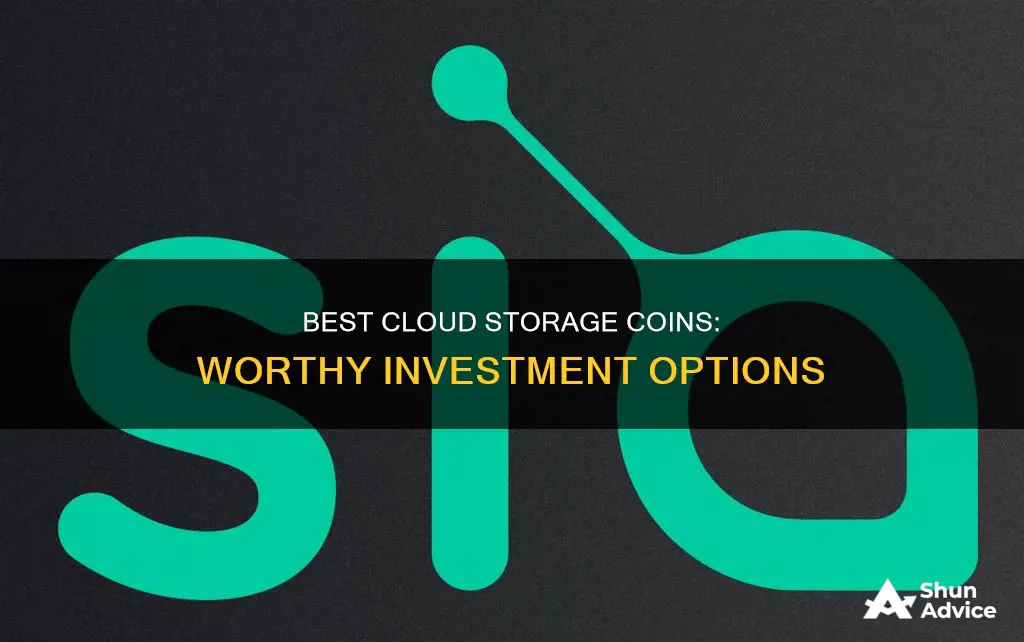
Cloud storage coins are a type of cryptocurrency that allows users to store their data on a blockchain network in a decentralised manner. This removes the need for a centralised storage host, such as Amazon or Dropbox, and negates the issue of a single point of failure.
One of the benefits of using storage coins is that they offer lower costs and more control and privacy compared to centralised cloud storage services. Additionally, because they are decentralised, users can store and retrieve data without depending on a single company or server.
Some examples of storage coins include Arweave (AR), Filecoin (FIL), Storj (STORJ), and Siacoin (SC). These coins are native to providers of cloud storage services and can be used to fulfil functions such as aiding security and providing user incentives.
| Characteristics | Values |
|---|---|
| Type | Crypto storage tokens, storage coins, storage cryptos |
| Definition | Altcoins native to providers of decentralised cloud storage services |
| Aim | To bring the cloud storage industry into the blockchain age |
| Function | Can aid security and provide user incentives |
| Advantages | More control and privacy, lower costs, no single point of failure |
| Examples | BitTorrent (BTT), Siacoin (SC), Arweave (AR), Filecoin (FIL), Storj (STORJ) |
What You'll Learn

Crypto storage tokens
- Arweave (AR): Arweave, founded in Scotland in 2018, has developed a unique technology called "block weave" to store user data in a decentralized way. Transactions are completed faster as any block can be checked to determine if a user can perform a transaction. Users can store all kinds of data, from videos and music to NFTs and dApps, on Arweave's blockchain.
- Filecoin (FIL): Filecoin is an open-source, decentralized storage platform built on blockchain technology. It uses a peer-to-peer network with three types of users: clients, storage miners, and retrieval miners. Customers can request to store or retrieve data, and miners facilitate these transactions on a fee basis. Filecoin's blockchain uses the FIL cryptocurrency for payments.
- Storj (STORJ): Storj, founded in 2014, is one of the first decentralized storage systems. It uses nodes that provide additional space on their hard drives for users to store encrypted data. Users pay in STORJ to access stored data and for the storage space they use. The system offers enhanced security due to its decentralized nature and the use of a special software called Tardigrade.
- Siacoin (SC): Siacoin, named after the Egyptian goddess of perception, is the cryptocurrency used on Sia's decentralized network. Sia acts as a secure, trustless cloud storage marketplace where users can lease access to their unused storage space. Siacoin acts as the means of payment on the network, with hosts locking SC into smart contracts as collateral.
- SONM (SNM): SONM is a decentralized platform that allows users to make their unused computing power available on the blockchain. It aims to create a "supercomputer" through blockchain technology, constituting a fog computing platform. Data can be processed faster than when stored on a central cloud due to fog computing. Users can rent out their computing power and get paid in SNM tokens or pay to use these services.
- BitTorrent (BTT): BitTorrent is a well-known distributed file-sharing platform with a crypto storage token of the same name. BTT functions as a hub for various BitTorrent features and is the basis for dedicated decentralized applications (DApps). Users can earn rewards in BTT for engagement activities such as seeding on the network.
A Small Investment, Big Returns: Bitcoin's $100 Entry Point
You may want to see also

Blockchain storage
- Arweave (AR): Arweave, founded in Scotland in 2018, has developed a unique technology called "block weave" that allows transactions to be completed faster. Users store their data on a layer called the permaweb, which runs on Arweave's blockchain.
- Filecoin (FIL): Filecoin is an open-source, decentralised storage platform built on blockchain. It uses a peer-to-peer network with three types of users: clients, storage miners and retrieval miners. Customers can request to store or retrieve data, and miners can store or retrieve this data for a fee.
- Storj (STORJ): Storj is an open-source storage platform that uses nodes to provide additional space on their hard drives for users to store data. When a user uploads files, they are divided into small pieces and encrypted before being stored on various nodes.
- Siacoin (SC): Siacoin is the cryptocurrency used on Sia's decentralised network. Sia acts as a secure, trustless cloud storage marketplace where users can lease access to their unused storage space. Files stored on the network are divided into 30 encrypted segments, each stored with a unique host.
- SONM (SNM): SONM is a decentralised platform that allows users to make their unused computing power available on the blockchain. It aims to create a "supercomputer" through blockchain technology, allowing for faster data processing than traditional cloud solutions.
- Holo (HOT): Holo is a platform for building decentralised applications, powered by the Holochain platform. Each node in the Holo network stores a different piece of information, providing more storage than blockchain, where each node has the same information.
These are just a few examples of blockchain storage coins, but there are many others available, each with its own unique features and benefits.
Bitcoin's Stability: A Safe Investment Haven?
You may want to see also

Decentralized cloud storage
- Storj: An open-source, distributed cloud storage platform that uses zero-trust and zero-knowledge principles to ensure high levels of durability and security. It replicates and distributes data globally, saving costs and eliminating regional risks. Storj is compatible with AWS S3 and offers faster recovery and improved collaboration.
- Arweave: A blockchain-based decentralized file storage protocol that ensures data permanence. It utilizes a unique "block weave" technology, allowing faster transaction completion. Arweave's permaweb layer enables users to store various types of data, including videos, music, documents, NFTs, and web pages.
- Filecoin: A peer-to-peer, open-source decentralized storage platform built on blockchain. It uses the FIL cryptocurrency for payments and rewards for storage services. Filecoin offers client-controlled encryption and the ability to choose storage providers.
- Siacoin: The cryptocurrency used on Sia's decentralized cloud storage network, where users can lease unused storage space. Files are divided into 30 encrypted segments, each stored with a unique host. Siacoin acts as the means of payment on the network.
- MaidSafeCoin: A proxy token for the SAFE Network, a decentralized platform for storage, data exchange, and communication. The SAFE Network utilizes blockchain and advanced cryptography, ensuring data privacy and protection from attacks.
The Future of Bitcoin Investment: What You Need to Know
You may want to see also

Crypto storage explained
Crypto storage refers to using decentralised technology to store any form of data. It is a relatively new niche within the cryptocurrency ecosystem. Crypto storage tokens are altcoins native to providers of these cloud storage services. They can fulfil a number of functions, from aiding security to providing user incentives.
The idea of decentralised storage is not new, but having a token built into the experience remains a fairly unexplored area of cryptocurrency. As of 2020, CoinMarketCap lists 18 crypto storage tokens, with a combined market cap of over $1 billion. This is a tiny fraction of the overall cryptocurrency market cap.
Crypto storage tokens focus on decentralised cloud storage. Blockchain storage, on a technical level, refers to using decentralised technology to store any form of data. Crypto storage tokens are native to the providers of these cloud storage services.
Decentralised storage has benefits over traditional, centralised cloud storage. Centralisation has been the main source of security problems, with weak security costing cloud storage companies and users dearly. A hack of Dropbox in 2012, for example, leaked the data of 68 million users. Blockchain storage removes third parties from the equation, reducing costs, maintaining fewer physical assets, and securely automating as much of the process as possible. These savings are then passed on to the users.
Decentralised cloud storage is also more secure, as it removes the risks associated with online wallets, which are vulnerable to network-based theft. Cold storage, for example, involves removing private keys from an online environment, making it more difficult for hackers to access.
Some of the most well-known crypto storage tokens include BitTorrent (BTT) and Siacoin (SC). BitTorrent functions as a hub for various BitTorrent features and is the basis for a range of dedicated decentralised applications (DApps). Siacoin, which has been on the market since 2015, is the native token of the decentralised cloud platform Sia, which aims to use blockchain technology to solve the inefficiencies of traditional cloud storage.
GMT Coin: A Smart Investment Move?
You may want to see also

Cloud storage costs
Costs of Decentralized Cloud Storage
Crypto storage tokens are a relatively new niche within the cryptocurrency ecosystem, aiming to bring the cloud storage industry into the blockchain age. Decentralized cloud storage of one terabyte of data, for example, now costs around $1 per month.
- Arweave (AR): Users store their data on what is known as the permaweb, and can store all kinds of data, from videos to NFTs.
- Filecoin (FIL): An open-source, decentralized storage platform built on blockchain. Filecoin uses a peer-to-peer network with three types of users: clients, storage miners, and retrieval miners. Customers can request to store or retrieve data, and pay with the FIL cryptocurrency.
- Storj (STORJ): An open-source storage platform that uses nodes that provide additional space on their hard drives for users to store data. Users pay in STORJ to access stored data and for the storage space they use.
- Siacoin (SC): The cryptocurrency used on Sia's decentralized network, which acts as a secure, trustless cloud storage marketplace. Files stored on the network are divided into 30 encrypted segments, each stored with a unique host.
- Crust Network: A decentralized storage protocol built on the Polkadot blockchain, with storage solutions for both Web 3.0 and Web 2.0 systems.
Costs of Traditional Cloud Storage
The costs of traditional cloud storage services vary depending on the provider and the amount of storage required. Here are some examples of the costs of traditional cloud storage:
- Google Cloud: Pricing is based on data storage, data processing, and network usage. Data storage rates vary depending on the storage class and location of the user's buckets.
- PCloud: $139 for 500GB or $279 for 2TB of lifetime storage.
- Microsoft OneDrive: $4 per month for 100GB.
- Google Drive: $28 per month for 2TB.
- IDrive360: $60 per year for 2TB.
- AWS S3: $12-25 per month for 2TB.
It is worth noting that the costs of cloud storage have largely stayed the same or slightly increased over the years. However, when adjusted for inflation, the prices have actually decreased.
The Right Time to Invest in Bitcoin?
You may want to see also
Frequently asked questions
Crypto storage tokens are a relatively new niche within the cryptocurrency ecosystem. They focus on decentralized cloud storage, with developers aiming to bring the cloud storage industry into the blockchain age.
Some examples of good cloud storage coins to invest in include BitTorrent (BTT), Siacoin (SC), Arweave (AR), and Storj (STORJ).
Cloud storage coins offer lower costs, more control, and enhanced privacy compared to centralized cloud storage services. They also eliminate the issue of a single point of failure and allow users to store and retrieve data without depending on a single company or server.
Cloud storage coins can be purchased on various cryptocurrency exchanges and platforms, such as CoinMarketCap and CoinGecko. It is important to do your own research and carefully consider the risks associated with investing in cryptocurrencies before making any investments.







